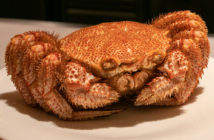Keiji Sakai was born and raised in Niseko, his father an owner and chef at Ryokan Sakae in Hirafu village. At a young age, Sakai observed his father in the kitchen and by the time he reached middle school, he had learned how to make ramen and fried rice to serve to their guests at the restaurant.
28 years ago Ryokan Sakae was one of the few restaurants that was open in Hirafu Village, and it kept his family very busy. However, Sakai still recalls how Hirafu village slowly changed over time.
After high school, Sakai started his first culinary job at a hotel in Sapporo, although he was interested mainly in Japanese cuisine, he was also given the opportunities to learn about Chinese and Western cuisines. He trained and worked in the hotel for 5 years before he moved back to Niseko to help at his father’s Ryokan restaurant. Unfortunately, by the time he moved back to Niseko, there had been a period of rapid expansion due to foreign investment and business had become very competitive so his father decided to close down his Ryokan restaurant.

Even though Sakai’s father closed down his restaurant, he still wanted to continue in the culinary arts, so he started a mission to open his own restaurant while seeking ways to introduce new dishes and make use of Niseko’s fresh local produce. One day, he decided to go to Sapporo to find inspiration and found a soup curry restaurant. He was surprised by the delicious taste of this new style of curry dish. Soup Curry originated in Sapporo and it became extremely popular in 2002, resulting in more than 200 soup curry restaurants opening in the Sapporo area alone. After trying the dish he said to himself, “I am going to open the first soup curry restaurant in Niseko”
His international culinary experience in the hotel restauarant trade made this transition easy, as he had gained experience with making ramen broth and he knew that soup curry would be the perfect dish for locally grown vegetables.
That is how “Tsubara Tsubara” Soup curry all started, and it is now in its 6th year serving this great dish to locals and tourists.
What’s the best thing about soup curry?
The best thing about soup curry is the delicious slow cooked soup broth and lots of local vegetables, especially the potatoes. I have been eating potatoes from Niseko all my life, so I know they are definitely the best potatoes in Japan, and I will never get tired of eating them. We try to use as many local vegetables as possible even in the winter season.
What do you usually do during summer?
I try to spend more time with my family, especially my kids, because in the winter, it gets really busy. I also spend much of my time remodeling my restaurant, trying to improve or change it.
What do you think of overseas guests coming to the restaurant?
When we opened the restaurant, there were a lot of locals trying our soup curry and not many foreign customers, and in the summer there were many Japanese tourists. Now, we have all kinds of guests, especially in the winter.
Over the last few years, we’ve noticed an increase in the number of repeat customers. I’m still nervous to speak with customers from overseas in English, but people from many different countries come to our restaurant, and it makes me happy to see familiar faces.
Did you make any changes after you noticed more customers from overseas?
Before Tsubara Tsubara, I was able to help and talk to all the customers at my father’s Ryokan restaurant. It is fortunate that we are able to serve so many customers, however, now that I run my own restaurant, it has become harder for me to have time to talk to each customer. I am also very interested to see how Niseko will change and develop over the next 10 years.
What is your expectation for Niseko?
I am pretty optimistic about Niseko’s future and I’m excited to continue working with all the people supporting me. Also, I am hoping to see more borderless networks where locals connect to each other as more than just business partners, along with visitors from all over the world.




